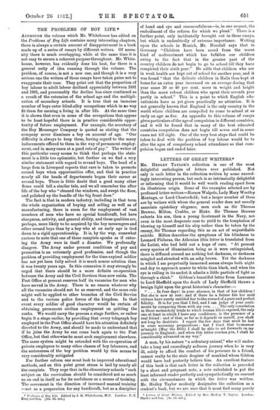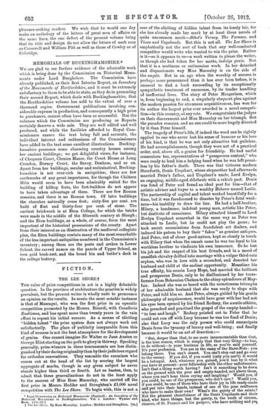LETTERS OF GREAT WRITERS.* Mn. INDUST TAYLOR'S collection is one
of the most delightful anthologies of letters ever published. Not only is each letter in the collection written by some exceed- ingly interesting person, but each is so intrinsically delightful or informing that it would be well worth reading apart from its illustrious origin. Some of the examples selected are by professed letter-writers—Horace Walpole, Lady Mary Wortley Montagu, or Lord Chesterfield; but a larger number of them are by writers with whom the general reader does not usually associate epistolary elegance, men such as Sir Thomas Browne, Milton, Crabbe, or Blake. Sir Thomas Browne exhorts his son, then a young lieutenant in the Navy, not even in the most desperate case to yield to the temptation of blowing up himself and his ship rather than be taken by the enemy, Sir Thomas regarding this as an act of unjustifiable suicide. Milton describes the symptoms of his blindness to Leonard Philaras, the Athenian (this letter is translated from the Latin), who had held out a hope of cure. "At present every species of illumination being as it were extinguished,
there is diffused around me nothing but darkness, or darkness mingled and streaked with an ashy brown. Yet the darkness in which I am perpetually immersed seems always both night and day to approach nearer to white than black, and when the eye is rolling in its socket it admits a little particle of light as through a chink." Gibbon's beautiful letter from Lauaanne
to Lord Sheffield upon the death of Lady Sheffield throws a benign light upon the great historian's character: -
" . . . In four days ! in your absence, in that of her children ! But she is now at rest : and if there be a future life her mild virtues have surely entitled her to the reward of a pure and perfect felicity. It is for you that I feel, and I can judge of your senti- ments by comparing them with my own. .. . The only consolation in these melancholy trials to which human life is exposed, the only one at least in which I have any confidence, is the presence of a real friend : and of that, as far as it depends on myself, you shall not long be destitute. I regret the few days that must be lost in some necessary preparations : but I trust that to-morrow se'nnight (May the fifth) I shall be able to set forwards on my journey to England ; and when this letter reaches you, I shall bo considerably advanced on my way."
A man, by his nature "a sedentary animal," who will under-
take a long and exceedingly arduous journey when he is very ill, solely to afford the comfort of his presence to a friend, cannot really be the stoic despiser of mankind whom Gibbon would have had posterity believe him. An excellent feature of this book is that each letter in the collection is preceded
by a short and pregnant note, a note calculated to put the least informed reader perfectly and sympathetically au courant with the circumstances in which the letter was written. Mr. Hedley Taylor modestly designates the collection as a student's book, but we are sure that it must find many purely • Letters of Great Writers. Edited by Rev. Hcd!ey V. Taylor. London : Blackic and Son. 1.40. Gd. net.]
pleasure-seeking readers. We wish that be would one day make an anthology of the letters of great men of affairs on the same lines, the one defect of the present volume being that its title and design do not allow the letters of such men as Cromwell and William Pitt as well as those of Cowley or of Coleridge.



















































 Previous page
Previous page